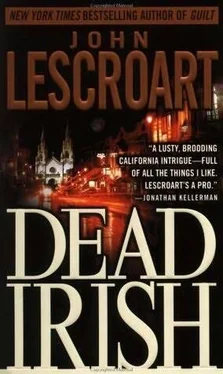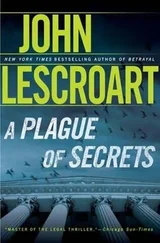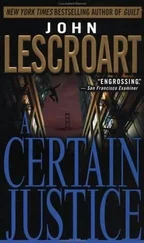John Lescroart - Dead Irish
Здесь есть возможность читать онлайн «John Lescroart - Dead Irish» весь текст электронной книги совершенно бесплатно (целиком полную версию без сокращений). В некоторых случаях можно слушать аудио, скачать через торрент в формате fb2 и присутствует краткое содержание. Жанр: Триллер, на английском языке. Описание произведения, (предисловие) а так же отзывы посетителей доступны на портале библиотеки ЛибКат.
- Название:Dead Irish
- Автор:
- Жанр:
- Год:неизвестен
- ISBN:нет данных
- Рейтинг книги:4 / 5. Голосов: 1
-
Избранное:Добавить в избранное
- Отзывы:
-
Ваша оценка:
- 80
- 1
- 2
- 3
- 4
- 5
Dead Irish: краткое содержание, описание и аннотация
Предлагаем к чтению аннотацию, описание, краткое содержание или предисловие (зависит от того, что написал сам автор книги «Dead Irish»). Если вы не нашли необходимую информацию о книге — напишите в комментариях, мы постараемся отыскать её.
Dead Irish — читать онлайн бесплатно полную книгу (весь текст) целиком
Ниже представлен текст книги, разбитый по страницам. Система сохранения места последней прочитанной страницы, позволяет с удобством читать онлайн бесплатно книгу «Dead Irish», без необходимости каждый раз заново искать на чём Вы остановились. Поставьте закладку, и сможете в любой момент перейти на страницу, на которой закончили чтение.
Интервал:
Закладка:
When Eddie had come to the rectory that night-Erin’s first son, the son they should have had together-with that special fire that only he possessed, and told him he and Frannie were going to have a baby, he finally could stand it no longer.
How did one boy deserve all he had been given? Surely he, Jim Cavanaugh, who had spent his whole life denying, denying, being denied, should have been given a chance, one brief moment, for this boy’s happiness?
But that had never happened.
And now the son of the love of his life-God forgive him, but it was true-now Eddie would have it all. Everything he had ever really wanted, and now, clearly, would never have. It was too much to bear. He couldn’t let him have it, couldn’t let the privileged happiness go on for still another generation.
So that night, with Eddie’s newfound strength and hope and confidence, he had suggested, since he was planning to meet Cruz anyway, that he go down with him, bring the whole weight of the moral argument to bear. Surely two such charming, persuasive, wonderful people could not help but succeed. In the heady flush of expectant fatherhood, Eddie had lapped up those oily words, believing as only he could that everything was possible.
And Jim Cavanaugh was convincing, wasn’t he? Eddie could save Army, save Polk from himself, save the whole goddamn world. Why shouldn’t he feel that? He was young, strong, his manhood verified! He, Eddie Cochran, could do it all!
Yes, it had just been too much to take. But now, now, living with it, Cavanaugh could see that the light, even the dim reflected light he’d lived for, had gone from Erin ’s eyes.
Still, he had to believe that God had forgiven him, though it was beyond his power to fathom such forgiveness. He would have to put his faith in the Lord. The greatest sin, after all, was despair -despair that God would abandon any, even the most unworthy, of his sheep. Despair was loss of hope, a graver sin even than murder. That was what he was fighting now, the temptation to despair.
Because he knew he had to kill again.
He was walking out to the garage with Dietrick, the sun bright in a deep-blue sky.
“Are you really worried about her?” the young priest asked.
Cavanaugh shook his head. “Ever since”-he stopped-“the Cochran boy-Eddie-died. You haven’t noticed the change?”
Dietrick stopped halfway across the asphalt, trying to remember. “I guess I take Rose too much for granted. Another of my failings.”
Cavanaugh laid a gentle arm on Dietrick’s arm. “She confides in me. That’s all. It’s no reflection on you.”
“Still…”
“I think”-Cavanaugh paused, wanting to phrase it right-“I think my reaction to Eddie’s death, taking it so hard-” Dietrick started to interrupt, but Cavanaugh pressed on. “No, I know it’s understandable, but maybe I should have hidden it from her a little better. It got Rose thinking about her… her own loneliness, I guess. Her husband. All that she’s missed over the years.”
They were walking again. “You think it’s serious?” Dietrick asked.
“I think it’s very serious,” he answered quickly. But then he brought himself up short. “I don’t mean to panic you. I don’t know. She was up when I got in late a few times the past week, couldn’t sleep. Sometimes that’s an indication.”
They got to the garage. Dietrick had parked his car beside it, not wanting to cram his new Honda into the smallish space next to Cavanaugh’s. “Should we get her some help, do you think? Beyond ourselves, I mean.”
“I think it’s worth thinking about. She hides it well, but I believe she really has been very depressed.”
Dietrick got in the car and rolled the window down, thinking about it. “I ought to pay more attention. It’s good you noticed, Jim.”
Cavanaugh waved it off. “I’ve got to be out all this morning, but maybe this afternoon when you get back…?”
“Definitely, we’ll get her straightened out.”
Cavanaugh waited a minute, standing by the garage, watching the car disappear around the front of the rectory. All right, he thought. Dietrick was convinced, he was reasonably sure, that Rose has been badly depressed lately, would swear to it on a stack of Bibles.
Bless Father, always thinking of others, Rose thought.
Father Dietrick had gone down to the airport to pick up one of the Maryknoll missionaries who would be spending the rest of the week at the rectory and preaching next Sunday. Father Cavanaugh, after saying early Mass and having breakfast, had of course offered to make the drive himself to the airport. He always offered, and he would have done it, too, but the younger priest thought it was his duty.
After they’d said good-bye to Father Dietrick, he’d given her his devil-may-care grin and said: “Well, Rose, m’dear, what are your plans on this fine day?”
Naturally, he knew that she’d have to get the rectory especially clean for their guest, so he was teasing and she told him so.
“Now, Rose, have you made the bed?”
“Of course, Father.”
“And you’ve dusted and swept.”
“Yes, but there’s still the flowers and towels to lay out, and…”
He held up a hand. “Have you any idea what a treasure you are?” he asked. She felt herself flushing.
“Look at this day! God’s glory shines down on us!”
“It is nice,” she said, wishing she could string together a flowery phrase as he did so effortlessly and knowing she never could.
“It’s more than nice,” he said. “Here I’ve been drowning in depression, taking no advantage of these precious days of sunshine, when the Talmud tells us that man shall be called to account for every permitted pleasure he failed to enjoy. Do I want to be called to account for that?”
The Father was such a caution. He wouldn’t be called to account for anything. She smiled at him. “No, Father, certainly not.”
“Then how about if we go on a picnic together and celebrate this day? You’ve done enough for our guest’s room. I’m sure he’ll be very happy.”
She tried to object, but he overrode her. “Rose, the man’s been living in a hut with no floor in western Brazil for three years. I think our guest room will be fine.”
“What about the fathers’ lunches?” she asked, although a picnic sounded like her idea of heaven.
Father rolled his eyes as he sometimes did, too polite to laugh at her. “We’ll write a note,” he said. “They’ll make do, I’m sure.”
So now the sandwiches were made-mortadella and Swiss with the hot peppers Father liked on fresh sourdough rolls. She made two for him and one for herself, though she didn’t think she could eat the whole thing. She put several dills in a big Zip-lock bag with some of the brine, and there was leftover potato salad in the fridge. They’d pick up some cold beer for Father on the way out to the park-that’s where he thought they’d go, rowing out on Stow Lake-and a soft drink for herself.
Through the kitchen window, she saw Father coming from the garage, far out across the asphalt at the back edge of the wide parking lot. He still walked heavily, as though he carried the cares of the world with him on his shoulders. And in a sense, she thought, he probably did. The picnic would do him good, would get his mind off the Cochrans and the sadness of the past couple of weeks.
And she wouldn’t be an old stick-in-the-mud, either. She could tease him along and get him laughing, and that’s what he needed now-a dose of the carefree, a couple of beers, a day in the sunshine.
She turned back to pack the basket.
“So how’re we coming?”
Lord, he had come in so quietly. It startled her.
“I’m sorry, Rose. Did I scare you?”
Читать дальшеИнтервал:
Закладка:
Похожие книги на «Dead Irish»
Представляем Вашему вниманию похожие книги на «Dead Irish» списком для выбора. Мы отобрали схожую по названию и смыслу литературу в надежде предоставить читателям больше вариантов отыскать новые, интересные, ещё непрочитанные произведения.
Обсуждение, отзывы о книге «Dead Irish» и просто собственные мнения читателей. Оставьте ваши комментарии, напишите, что Вы думаете о произведении, его смысле или главных героях. Укажите что конкретно понравилось, а что нет, и почему Вы так считаете.












